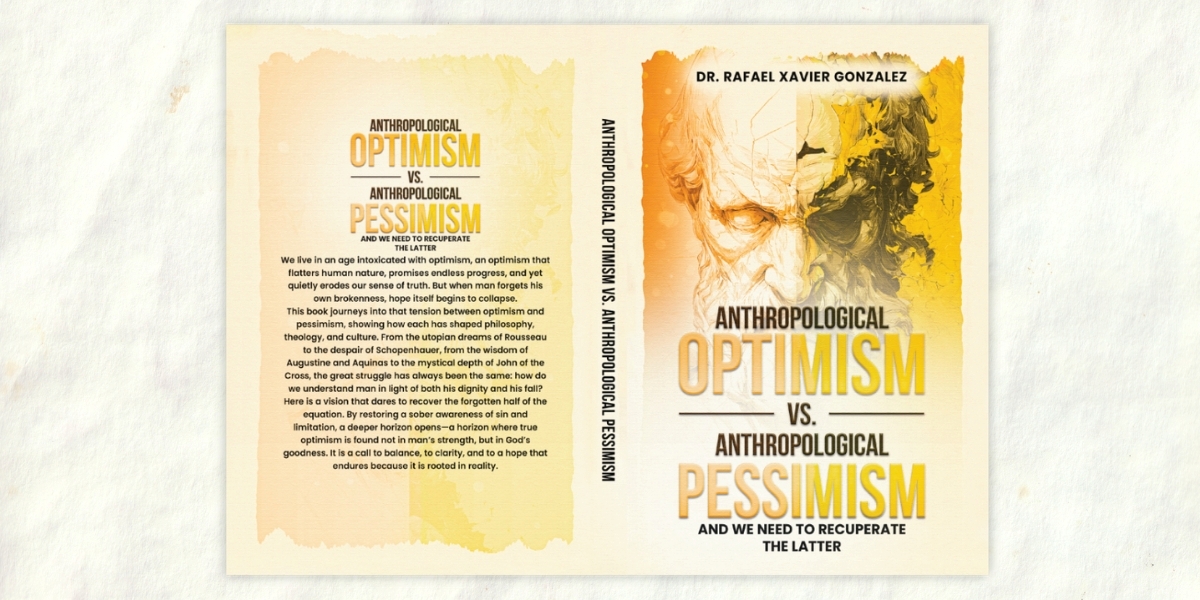By: Charles A. Ballentine
Many people today hold a comforting belief that human beings are naturally good. This idea is popular in self-help books, social movements, and even some modern religious teachings. It tells us that if we just look within, follow our feelings, and believe in ourselves, everything will be fine. But is this really true?
In his forthcoming book, Anthropological Optimism Vs Anthropological Pessimism And Why We Need to Recuperate the Latter, Dr. Rafael Gonzalez challenges this widespread view in a powerful and timely way. He argues that while optimism can be beneficial, it becomes problematic when it disregards reality. Misplaced optimism can create false expectations about human nature, leading to serious consequences for society, morality, and spiritual life.
Understanding Misplaced Optimism
Misplaced optimism is not about having hope or a positive attitude. It is about assuming that people are naturally good, that evil is just a result of ignorance or bad environments, and that we do not need God or grace to become better. This belief downplays the reality of sin and human brokenness.
Dr. Gonzalez explains that this view is not only untrue but harmful. When we pretend that people do not struggle with selfishness, pride, or wrongdoing, we blind ourselves to the truth. We often overlook the importance of personal change, moral responsibility, and spiritual growth. This kind of optimism turns into a trap rather than a strength.
How Modern Culture Encourages False Views
Our modern world often celebrates individual desires and feelings as the highest authority. The message is clear: follow your heart, trust your instincts, and reject anything that challenges your personal truth. This mindset sees traditional values, religious teachings, and moral limits as outdated or oppressive.
In Anthropological Optimism Vs Anthropological Pessimism And Why We Need to Recuperate the Latter, Dr. Gonzalez shows how this cultural shift has affected the way people think about human nature. Instead of recognizing our need for guidance, discipline, and divine grace, society teaches us that we are fine just as we are. This leads to confusion, anxiety, and broken relationships because people are not being honest about their limitations.
The Role of Faith and Reason
Dr. Gonzalez argues that both faith and reason are essential in understanding who we are. From a Catholic perspective, human beings are created in the image of God and have great dignity. But we are also affected by sin, which damages our relationship with God, others, and even ourselves. This is why both optimism and pessimism must be balanced.
The Catholic tradition does not teach that we are either totally good or completely evil. Instead, it teaches that we are capable of great love and great harm. We need grace to overcome our weaknesses and grow in virtue. This is where misplaced optimism fails. It removes the need for grace and replaces it with shallow positivity.
Why Pessimism Can Be a Healthy Correction
While optimism can inspire and uplift, there are times when a healthy form of pessimism is necessary. Dr. Gonzalez suggests that in today’s world, we need to adopt a more realistic view of human nature. This means recognizing that people often fall short, make mistakes, and choose the wrong paths.
This kind of pessimism is not about giving up or becoming cynical; it’s about being realistic. It is about being honest. When we accept the truth about our flaws, we open the door to real change. We begin to see why we need help from outside ourselves. We become more open to God’s mercy, guidance, and truth.
Conclusion
Dr. Rafael Gonzalez’s forthcoming book, Anthropological Optimism Vs Anthropological Pessimism And Why We Need to Recuperate the Latter, offers a necessary wake-up call. It urges readers to question the shallow optimism that dominates modern thought and to seek a more comprehensive, accurate understanding of human nature. By embracing both our dignity and our brokenness, we can build lives that are not only realistic but also full of genuine hope.
If you’re seeking a deeper understanding of humanity, faith, and truth, look out for this significant release. It will challenge your assumptions, deepen your thinking, and inspire you to seek a better way forward—one rooted in both reason and revelation.
Disclaimer: The opinions expressed in this article are those of Dr. Rafael Gonzalez and reflect his views on human nature, optimism, and pessimism. This article is for informational purposes only and should not be construed as legal, medical, or professional advice.


















